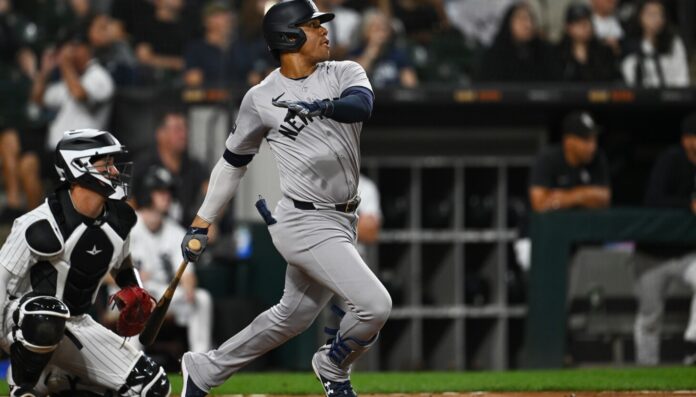I know that, on some level, I’m supposed to be angry about Juan Soto’s $765 million land mass of a contract with the Mets. In a former life, I might have been. I can hear the younger me howling: Bad for the game! The haves having their way again! Competitive balance being force-marched to the fiction section of the baseball library!
But acceptance, if not wisdom, often wins out as you get older. And so I ask myself the most hands-off, laissez-faire question of all about Soto’s big day: So what? Or, in more selfish terms: This affects me how?
If the Mets want to spend that much money on one player, bless them. Maybe it will make the big-market teams that don’t spend like big-market teams start acting the part. In the case of the Cubs, it probably won’t. Shame hasn’t worked yet.
In the case of small-market teams, well, sorry, this is how the marketplace works. If you can’t keep up, sell your team to someone who can. Or find some big-pocket investors who want the ego gratification that comes with saying you’re a part owner. Surely there’s a warm-and-cuddly private equity firm out there that can relieve White Sox chairman Jerry Reinsdorf of his, and our, burden.
It’s the Mets, the Yankees and the Dodgers. And then there’s everybody else. It’s on everybody else to catch up.
Mets owner Steve Cohen believes that Soto is worth $51 million a year over 15 years, with none of the money deferred. That means he is worth it. There’s really no deeper meaning, no need for a ritual what’s-wrong-with-society-these-days wringing of hands. It’s an ungodly sum, to be sure, but it’s an ungodly sum that someone is willing to pay. Get over it.
We’ll see if the Mets are right. But one thing is indisputable: They ponied up to find out if they are.
We keep hearing that baseball’s popularity continues to drop because our fast-paced world, addicted to action, doesn’t appreciate a slower sport the way it once did. Maybe so. But Major League Baseball is starting to come around to the idea of star power – about 20 years late, but at least there are signs of life. Soto hits a lot of home runs, walks a lot and strikes out a lot, which makes him the Ideal Man in today’s game. He helped fill seats at Yankee Stadium last year, not that the franchise needs much assistance in that department. But he’s a star, and the Mets didn’t need a telescope to see that.
Shohei Ohtani is a star, too, which is why the Dodgers gave him a 10-year, $700 million contract last year. In 2024, he became the first player to hit 50 home runs or more and steal 50 bases or more in a season. He also happens to be a superstar pitcher when his arm is not recovering from surgery. Thus, every at-bat and every windup is an event. Fans want to see it.
Teams like the Mets and the Dodgers are not the enemy for spending big money on superstars. They know their fans expect a winning product. The more insidious enemy is the teams that have a lot of money but don’t spend it, even as their ballparks are full of paying customers. I can think of one local baseball team that might fit that category. Can you?
There is, of course, a trickle-down effect. Big contracts eventually find their way into the cost of tickets, concessions and parking. So you, the consumer, end up paying more. But if you want prices to stop going up, there’s a solution: You can stop consuming. Don’t buy tickets. Maybe that will bring player salaries down throughout baseball.
Fans have power. But many can’t help themselves. Even as they’re bemoaning skyrocketing ticket prices, they’re still going to games, especially to NFL games. Several times over the years, I’ve written that Bears fans should boycott Soldier Field to show their dissatisfaction with the product. To date, they haven’t. It must be a disease. Or a hereditary condition. But you get what you pay for, which in this case is one playoff victory since the 2006 season.
To the Mets, Yankees and Dodgers, teams that are hugely profitable, stars are important because they show a demanding fan base that they’re doing everything they can to win. Signing big-ticket free agents doesn’t automatically lead to success, but it does send a message to the fan base that, hey, we’re serious about this winning thing.
Competitive imbalance isn’t the issue. Owners unwilling or unable to spend money is. The answer? Better owners.
